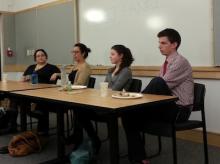To Doug McManaway, a 2010 graduate of LSJ who works at the Washington State Bar Association, the path to a job is “definitely like Candy Land, a little bit.” Reaching your end goal requires hints from your contacts and, often, just a bit of luck.
On April 9, four LSJ alumni sat on a panel to talk about life after college. The four panelists gathered with a group of about 20 students from LSJ, Political Science and other majors to discuss what it was like to work in the legal field without being lawyers.
Some of the most important advice they dispensed involved being involved in the community.
“I can’t put enough emphasis on the importance of internships and volunteer work,” said 2006 graduate Alicia Briones of the ACLU of Washington, the organization behind I-502 and R-74. The significance of internships and work was a sentiment repeated by her fellow panelists. Having more experiences and broadening your horizons, they said, would open up random opportunities and allow you to get a better idea of what you want to do—or, at the very least, of what you don’t want to do.
McManaway, for example, believed he would be a concert pianist through most of high school and even a little bit of college. Today, he’s studying for his LSATs and working at the Washington State Bar Association.
It’s an experience that these alums have already experienced, or are still experiencing.
After graduating in 2009, Martina Kartman sold her car and everything she had and left Seattle, thinking she would never look back. Instead, she returned to the city after traveling for a year. When she came back to the Emerald City, the transition back into working life was rough.
She worked as a waitress and as a temporary worker at a private law firm. Now, she works as a legal assistant for Columbia Legal Services, a nonprofit located in downtown Seattle. She also works in a clinic within the organization, and expressed her satisfaction—at least for now—of the job she has held for the past two years.
Leslie Berkseth, a 2011 graduate, has been planning to go to law school ever since she was young. Though she originally thought she would go straight there after graduating from UW, life got in the way. Even so, she says that she is “really glad I’ve taken time off to become an adult.” Now that she has real experience in the legal world, she feels that she has a better idea of the type of law she wants to do when she applies to law school in the upcoming fall.
The panelists cited the importance of this knowledge of future goals when considering going into law. According to them, many people end up in law school because they don’t know for sure what they want to do, and working toward a juris doctorate seems like a better answer than a blank stare in the face of curious relatives. But this leads to a problem: one aspect of being a lawyer that deterred this alumni group was the saturation in the job market of law school graduates. A couple of the panelists stated that most lawyers they know or have heard of end up out of work.
For Briones, being a lawyer didn’t fit her goals. Though she had wanted to go to law school in her undergraduate years, she’s ultimately glad she did not. Briones aimed to work in education as a lawyer to contribute and give back to the community at large. What she realized, however, was that there is more than one path to her objective.
“I realized that the best thing I could do was to keep people from being railroaded into the criminal justice system,” she said. “The best way to do that is through education or by helping them through minor infractions that might lead to bigger issues. It would be helping them more at the beginning instead of at the end.”
All of this is not to say that you shouldn’t apply for law school if it’s something you’re planning, but, as in most situations, you should know what you’re getting into. At least two of the panelists are preparing to go, either by studying for the LSATs or applying to schools.
“It’s always really nice and reassuring to hear from individuals who have been through the anxieties of asking, ‘What am I going to do after graduation?’” said Anu Sidhu, a junior who attended and helped facilitate the event. “After hearing that uncertainties are normal and seeing that they’re each doing wonderful things now, those uncertainties are less daunting.”
All of the panelists are open to questions from LSJ students. You can find some of their contact information in the Alumni Directory and below:
Leslie Berkseth of Bishop, White, Marshall & Weibel: lberkseth@gmail.com
Alicia Briones of the ACLU of Washington yeltay@gmail.com
Martina Kartman of Columbia Legal Services mkartman@gmail.com
Doug McManaway of the Washington State Bar Association: doug.mcmanaway@gmail.com
This article was composed by Kristine Kim.
